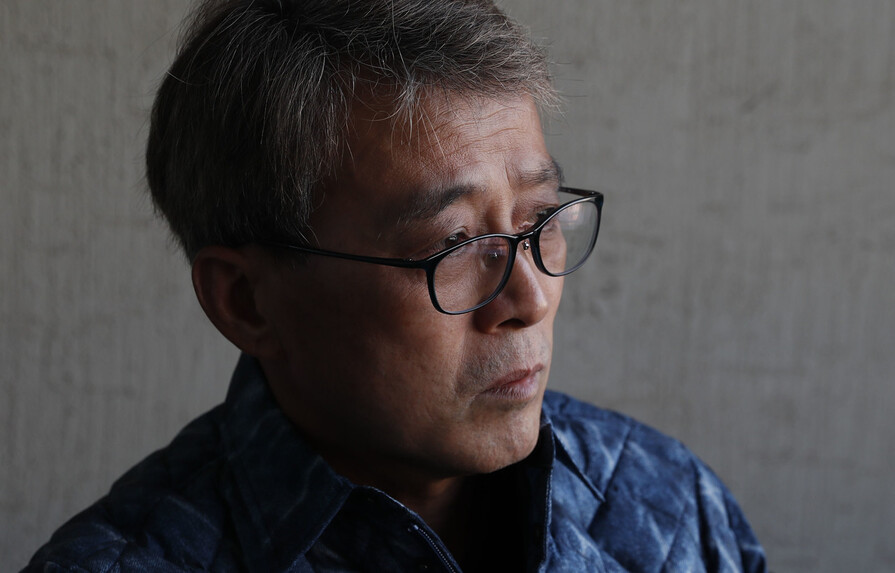Last year, Sung-jae Jeong, who lost his son Jeong Yu-yeop in a medical vacuum in the early stages of the spread of Corona 19, at a lodging in Jung-gu, Seoul. <한겨레>I am interviewing with. By Kim Hye-yoon, staff reporter
On the evening of the 16th, my father stopped crying the day he finally arrived in Seoul, walking over 300km. Unfortunately, on this day, the son’s social network service (SNS) account, which had been open until now, has been converted to a dormant account, and it has not been opened anymore. On March 10, last year, when the first outbreak of Corona 19 was in the midst of Daegu and Gyeongbuk, his son Jung Yoo-yup (at the time 17 years old) developed symptoms of high fever and shortness of breath over 40 degrees. Two days later, on the 12th, I visited Gyeongsan Central Hospital in Gyeongsangbuk-do, but said the screening clinic was closed and did not provide emergency room treatment. Only antipyretics and antibiotics were prescribed. It wasn’t until the afternoon of the next day that I was told to go to a high-ranking general hospital, but I was told that it was impossible to transfer an ambulance because of the suspected Corona 19. In the end, Jeong Seong-jae, 54, who held the steering wheel with a numb hand for chemotherapy, took his son directly to Daegu Yeungnam University Hospital, but Jeong-gun died of acute pneumonia five days later on the 18th. “I can’t forget the excitement that the doctor in charge said about two hours before Yuyeop’s death that Yuyeop had a positive test for Corona 19 and that it was a’variant virus that should be reported to the World Disease Society.’ But after his death, one prosecutor tested negative.” On the 17th, Mr. Jeong, who met at a hotel in Seoul, said. During the year after his son’s death, Mr. Chung learned a lot. I also thought that if there was a public hospital in the area, it would have prevented the death of my son. While attending various discussion meetings to investigate the truth, I learned about the medical blanks of the vulnerable. After the public hospital became a dedicated hospital for Corona 19, patients in public hospitals were forced to transfer to private hospitals, and they were told that they gave up treatment because they could not afford treatment. “A public hospital with the size of at least a medical center would have been equipped with a negative pressure room, and patients with fever could be treated separately. I got a sense of responsibility as Yoo-yup thought that the incident should not be regarded as an unfair family affair of an individual, but should be confronted with work for the public good of society.” This is the reason why he demanded the strengthening of medical publicity and the expansion of public hospitals along with the investigation of the truth. However, despite numerous appeals to the government, there were no official answers or answers to prevent recurrence. They also filed a complaint with the National Human Rights Commission, but only received notice of dismissal. This is because Jeong started a walking parade of about 380km from Gyeongsan Jungang Hospital in Seoul to the Blue House in Seoul from the 22nd of last month to investigate the truth, express the government’s position, and strengthen medical publicity. So, after holding a press conference at the fountain in front of Sarangchae in the Blue House on the 18th, the first cycle of his son, Jung planned to deliver a letter of opinion through an interview with an official in the Senior Citizens’ Office. In the interview, he laughed, “I would just go and cry (if I had an interview),” and said, “I want to pretend to say that it would be good to become a government that comforts the pain and thinks together. However, Jeong’s wish did not come true. The Blue House Civil Society Chief’s Office sent a reply saying’there is no schedule.’ On this afternoon, a memorial festival was held in Gyeongsan, North Gyeongsang Province. By Seo Hye-mi, staff reporter
newsletter
Every morning, every Thursday day
A friendly newsletter that will save you from the flood of news.
Meet
